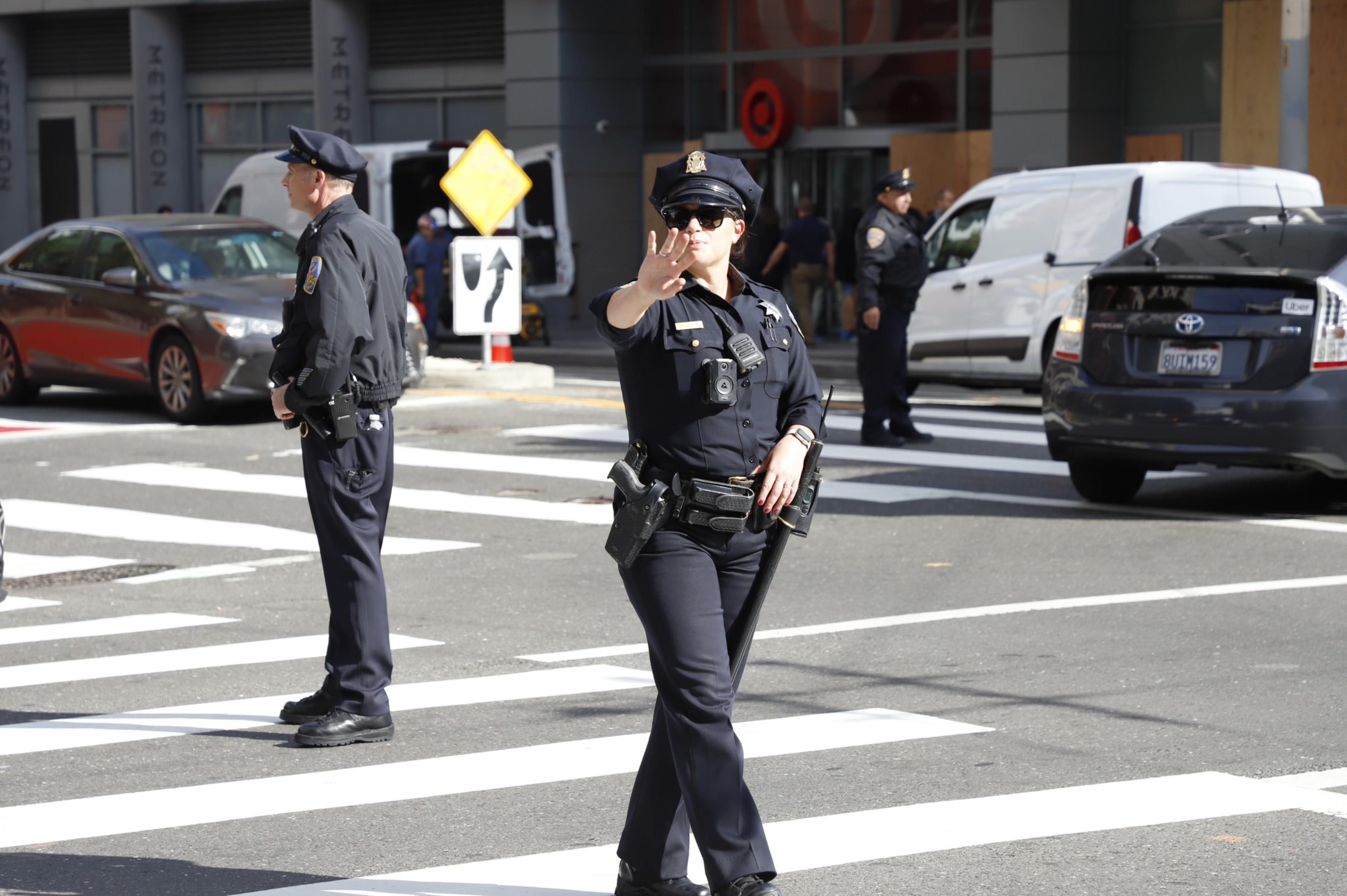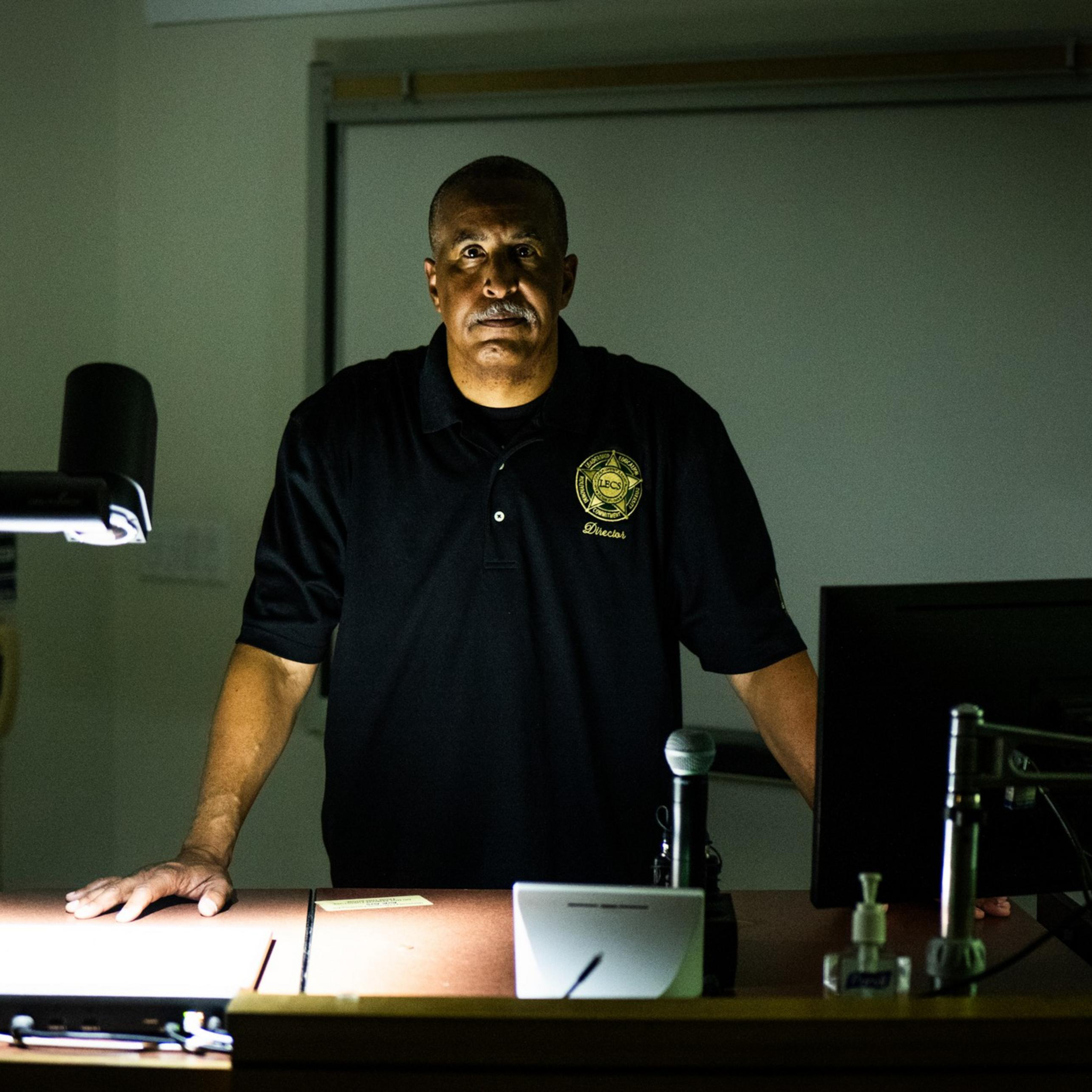The chatter of incoming freshmen at Sacramento State University filled a conference room on a recent hot day. Would-be students walked among tables touting clubs and options for academic aid.
At one station, a quartet of current students, wearing tucked-in green polo shirts and khaki cargo pants, offered another kind of opportunity: a future in law enforcement. The four were part of the 8-year-old Law Enforcement Candidate Scholars’ Program (opens in new tab), which prepares students for work in policing. Its founder, former Sacramento police officer Shelby Moffatt, says the program works with law-enforcement agencies that send officers to campus each week to teach students about the policing life.
“I’m just taking the mystery out of it. I’m gonna help you get there. We are a mentorship program,” said Moffatt. “This is the only program like this in the U.S.”

In the fall, the San Francisco Police Department will become the sixth agency to join the program.
Camila Aguilar, a 20-year-old program participant from Hollister, says students do end up applying to departments in the program. She believes that will also happen with SFPD.
“I feel like with other departments coming in, that’s definitely going to help them out,” she said about the personal relationships that have led to recruitment.
At a hearing in May, SFPD Deputy Chief Peter Walsh said he hopes the program will create a pipeline of motivated and prepared cadets — and that many of them will be women of color like Aguilar.
But while the initiative is a new way to expand the department’s ranks, observers say it won’t fill the growing gap in SFPD applicants. The San Francisco Police Officers Association has made dire predictions about the department’s ranks.
“We got problems. Big problems. If major action is not taken soon, we fear the damage to SFPD may be permanent,” the association tweeted in May. “We’re not sure if those who should know — know how bad things are or if they’re too afraid to look.”

In a video it made to address the issue (opens in new tab), the association said that for every eight vacancies created by retirements and departures, the department hires only one new officer.
SFPD spokesperson Evan Sernoffsky pointed out that the numbers are trending up.
“This year we are on track to have more recruits in the academy than any time since the pandemic hit in 2020,” he said. “And last month we started our largest recruit class in the last six years.”
But at the May hearing, Walsh acknowledged that while the department can pay for all the new officers it wants, applicants are sparse.
“It’s not the days where we can sit back like we used to and get 8,000, 9,000 applications and take our time,” he said. “This is a battle to get the best people for an amazing profession.”
Money is not the problem when it comes to recruiting. With the city’s single largest agency budget — $821 million — SFPD has ample funds to refill the ranks.

“If you give us a billion dollars tomorrow, it doesn’t give us police officers the next day,” Walsh said.
A lack of applicants for police departments nationwide has been a problem for several years, although that trend appears to be reversing (opens in new tab).
Applications to the SFPD began dropping in 2019, plummeting to a low of 1,586 in 2021 and coming up to 3,008 last year. Still, they remain far below numbers seen in previous years: 2014 saw more than 6,000 people apply to become cops.
Of those who apply, few make it through the tests, background checks and training to become officers. In 2023, 72 out of 3,008 applicants entered the academy; 40 graduated. In 2014, the department hired more than three times as many.
The department now has a deficit of 500 officers.

Along with advertising on social media and streamlining the application process, the department hired the marketing firm All-Start Talent (opens in new tab) to get more applicants in the door. Complicating recruitment issues: Before the end of the decade, the state will require future officers to have college degrees.
To that end, Sacramento State is the first in an ambitious plan to create pipelines from universities to the department. Supervisor Aaron Peskin is working on legislation to create similar programs at the University of San Francisco and San Francisco State University, where student recruits would spend summers training at the academy and be guaranteed jobs by the time they graduate.
Despite these efforts, even cheerleaders for the department acknowledge that more needs to be done to fill the ranks.
Supervisor Matt Dorsey, a former SFPD spokesperson, said he thinks the department is doing an admirable job with recruiting but needs to sell its image of a reformed, nicer, more open department.

“There’s an evangelical opportunity for the work that SFPD is doing,” he said. “This is a model of 21st-century policing in this country.”
Other insiders are less optimistic.
“Sometimes we hear staffing is an emergency at the department, and sometimes it doesn’t seem like the actions match that,” said Police Commissioner Kevin Benedicto. “It can’t be both. I think that it’s clear they’ve ramped up their recruiting efforts. But if the deficit is so severe, more needs to be done.”
Why are so few people applying to the SFPD? Many cops blame increased paperwork and oversight, as well as bad press in recent years, for the loss of interest in the profession.
A survey conducted by Police1 magazine this year found that officers said the No. 1 reason their job satisfaction had declined was a “presumption that police are wrong.” Next on the list were bad management and negative comments from citizens. Many respondents said they would not recommend the profession.
Police1 noted (opens in new tab) that “there can be little argument that the policing profession is experiencing an intense level of scrutiny which, although not completely unwarranted, is also unprecedented.”

When two incoming freshmen at Sacramento State were asked if they were interested in becoming police, they cited the danger of the work and the negative news coverage around law enforcement in recent years.
Some recruiting approaches have paid off, though.
The California Highway Patrol, for instance, saw a 94% jump in recruits from 2022 to 2024 after it launched a campaign with an online seminar and a web series called “Cadets (opens in new tab),” a fairly unvarnished version of the academy.
SFPD hasn’t done anything that novel, said former Commander Richard Corriea, although it has made recruitment videos (opens in new tab).
“In some ways, they do recruiting the same way they always have,” he said. “It has to be a revolution in how you reach out to people.”

